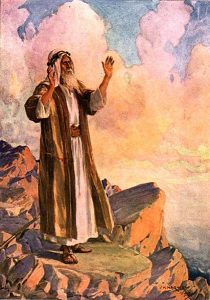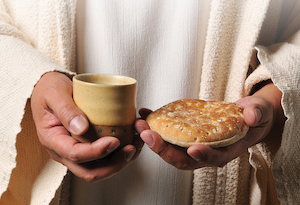The Power of Intercession and a God who Relents
 Today, as part of the M’Cheyne reading plan, I read Exodus 32, which describes God’s wrath when the Israelites began worshipping the golden calf while Moses is on the mountain. In response, God tells Moses that he will wipe out the people, and offers to start a new nation based on Moses. But Moses—the humblest of men—intercedes for the people, and in Exodus 32:12, he begs God to relent. And then follows this wonderfully hopeful verse:
Today, as part of the M’Cheyne reading plan, I read Exodus 32, which describes God’s wrath when the Israelites began worshipping the golden calf while Moses is on the mountain. In response, God tells Moses that he will wipe out the people, and offers to start a new nation based on Moses. But Moses—the humblest of men—intercedes for the people, and in Exodus 32:12, he begs God to relent. And then follows this wonderfully hopeful verse:
“So the LORD relented from the harm which He said He would do to His people.” Exodus 32:14
The word relent in Hebrew is nacham, which comes from a primitive root meaning to sigh or breath heavily, by implication to be sorry. As a positive action, it means to offer comfort. And I do find it comforting to think of God sighing…the way a mother sighs when she sees her kids fighting again…not in anger, but in sadness and longing for them to learn to play together peacefully, the way Jesus sighed and wept over Jerusalem (Luke 13:34).
David also experienced mercy when God relenting from destruction. When David sinned by numbering the people, the prophet Gad gave him three choices of punishments. David chose the plague because he trusted in God’s mercies. And indeed, in 2 Samuel 24:16, the Lord relented and David built and altar and worshipped.
And when the angel stretched out His hand over Jerusalem to destroy it, the LORD relented from the destruction, and said to the angel who was destroying the people, “It is enough; now restrain your hand.” 2 Samuel 24:16
Later, the Psalmist in recounting all of God’s goodness to Israel in Psalm 106 remembers also how God relented:
But they rebelled in their counsel
And were brought low for their iniquity.
Nevertheless He regarded their affliction, when He heard their cry;
And for their sake He remembered His covenant,
And relented according to the multitude of His mercies.
Psalm 106:43-45
Jeremiah the weeping prophet insists on God’s willingness to relent from judgment when people turn from their evil.
If that nation against whom I have spoken turns from its evil, I will relent of the disaster that I thought to bring upon it. Jeremiah 18:8
Five times he offers the hope of God relenting if his people will repent (Jeremiah 18:8, 26:3, 26:13, 26:19, and 42:10), but of course we know the judgment came as Babylon destroyed Jerusalem and took the people away.
Other prophets also remind us that God relents from harm when his people return to Him:
So rend your heart, and not your garments;
Return to the LORD your God,
For He is gracious and merciful,
Slow to anger, and of great kindness;
And He relents from doing harm. Joel 2:13
God relented of two disasters when Amos pleaded for his people in Amos 7:3 and Amos 7:6.
And even more famously (or infamously depending on how you feel about the Assyrians), God relented from his plan to destroy Nineveh when the people of the city turned from their evil ways at the preaching of Jonah.
Then God saw their works, that they turned from their evil way; and God relented from the disaster that He had said He would bring upon them, and He did not do it. Jonah 3:10
What does all this have to do with COVID-19? Surely a great evil has come upon us and the world. And truly, God is the same, yesterday, today, and forever. So we can be confident that when we intercede, our God is willing to change his mind.
Let us plead his mercies, turn away from our sins, and perhaps we also as David did will see God relent and halt the plague among us.


He alone is our ever present hope! In times if need!!!